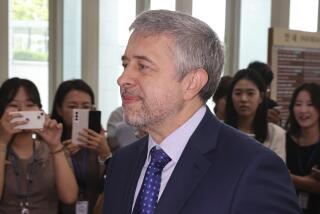Clinton’s Korea Deal a Test for Bush
WASHINGTON — The Bush administration is about to face the first real test of its Asia policy--namely, what to do about North Korea.
The question, in a nutshell, is whether President Bush’s new team will simply sign on promptly to what the Clinton administration has worked out with North Korea, or whether it will seek to put its own stamp on policy and take a tougher, more deliberate approach.
South Korean President Kim Dae Jung is coming to Washington next week to meet with Bush. His task will be to try to lock Bush in quickly and tightly to President Clinton’s policies.
Specifically, Kim will push Bush to reaffirm Clinton’s trouble-plagued 1994 deal to build nuclear reactors in North Korea in exchange for a freeze in its nuclear weapon program. And he wants the Bush team to complete a proposed deal Clinton nearly worked out late last year that would halt North Korea’s missile program.
Kim is the revered winner of last year’s Nobel Peace Prize and the architect of South Korea’s “sunshine” policies toward North Korea.
However, some less-exalted motivations also underlie his Washington trip. One is political. At the moment, Kim is not nearly as popular at home as he is abroad. The South Korean economy is floundering, and the opposition party is gaining strength.
Another factor is commercial. Under the 1994 deal, South Korean firms have landed most of the contracts to supply North Korea with nuclear reactors. Kim and his government fervently oppose any suggestion that this part of the agreement should be changed, even in ways that might make sense for North Korea.
For its part, North Korea is even more eager than the South for the Bush administration to sign onto Clinton’s policies. Last week, North Korea denounced the Bush team’s “hard-line stance” and warned that it might have to resume test-firing long-range missiles.
Amid all this maneuvering, the Bush team seems unperturbed. Administration officials scoffed at the renewed North Korean missile threat.
So far, the administration has given few signs of its intentions. But in private conversations, the outlines of its Korea policy are emerging.
On the one hand, the Bush team seems eager to slow the pace of the Clinton rapprochement with North Korea.
Last year, some Bush officials believe, Clinton was in too great a rush for a missile deal with North Korea. The new administration is willing to finish the missile negotiations, but only when it can nail down the verification procedures guaranteeing that North Korea’s missile program has ended.
On the other hand, the Bush team isn’t talking about dramatic reversals of Clinton’s Korea policy either. So far, at least, the differences on Korea between Bush and Clinton seem to be ones of timing and style, not substance.
Secretary of State Colin L. Powell already has told two top South Korean visitors, Foreign Minister Lee Joung Binn and intelligence chief Lim Dong Won, that the administration does not intend to disrupt Kim’s sunshine policy.
The biggest uncertainty is what the Bush administration will do about Clinton’s nuclear deal.
In 1994, the United States agreed to arrange for two civilian nuclear reactors for North Korea, with money coming from Japan and South Korea. In addition, the U.S. agreed to pay for heavy fuel oil for other North Korean energy needs.
A series of snafus has plagued the agreement in recent months. General Electric, which was supposed to supply the turbines, withdrew because it was unable to solve the problem of legal liability for accidents. Rising prices have made the American contributions of heavy fuel oil increasingly expensive.
Moreover, it’s not clear the 1994 deal can ever be completed. The agreement says the reactors can’t be shipped until North Korea submits to inspections of its nuclear facilities, and there is no sign it is willing to go along with these inspections.
Late last year, the Clinton administration briefly and quietly explored the idea of revising the 1994 agreement so that North Korea would be given conventional power equipment rather than nuclear reactors. But South Korea rebuffed the overtures.
Now, the Bush administration also acknowledges in private that a change in the 1994 deal might make sense: North Korea would get more energy supplies if it opted for conventional rather than nuclear power.
Yet administration officials also make plain that they consider Clinton’s 1994 agreement a done deal, and they won’t try to alter it unless North Korea is willing.
It appears that the new foreign-policy team doesn’t want to spend the time, energy and diplomatic capital that would be required to bring about a radically new North Korea policy.
The Bush team has other problems and other priorities: missile defense, Iraq, peace in the Middle East and, of course, domestic initiatives such as tax cuts.
On policy toward North Korea, the new administration seems to live according to that old adage: If it ain’t broke, don’t fix it. It may eventually find, however, that Clinton’s deal is beyond repair.
*
Jim Mann’s column appears in this space every Wednesday.
More to Read
Sign up for Essential California
The most important California stories and recommendations in your inbox every morning.
You may occasionally receive promotional content from the Los Angeles Times.









